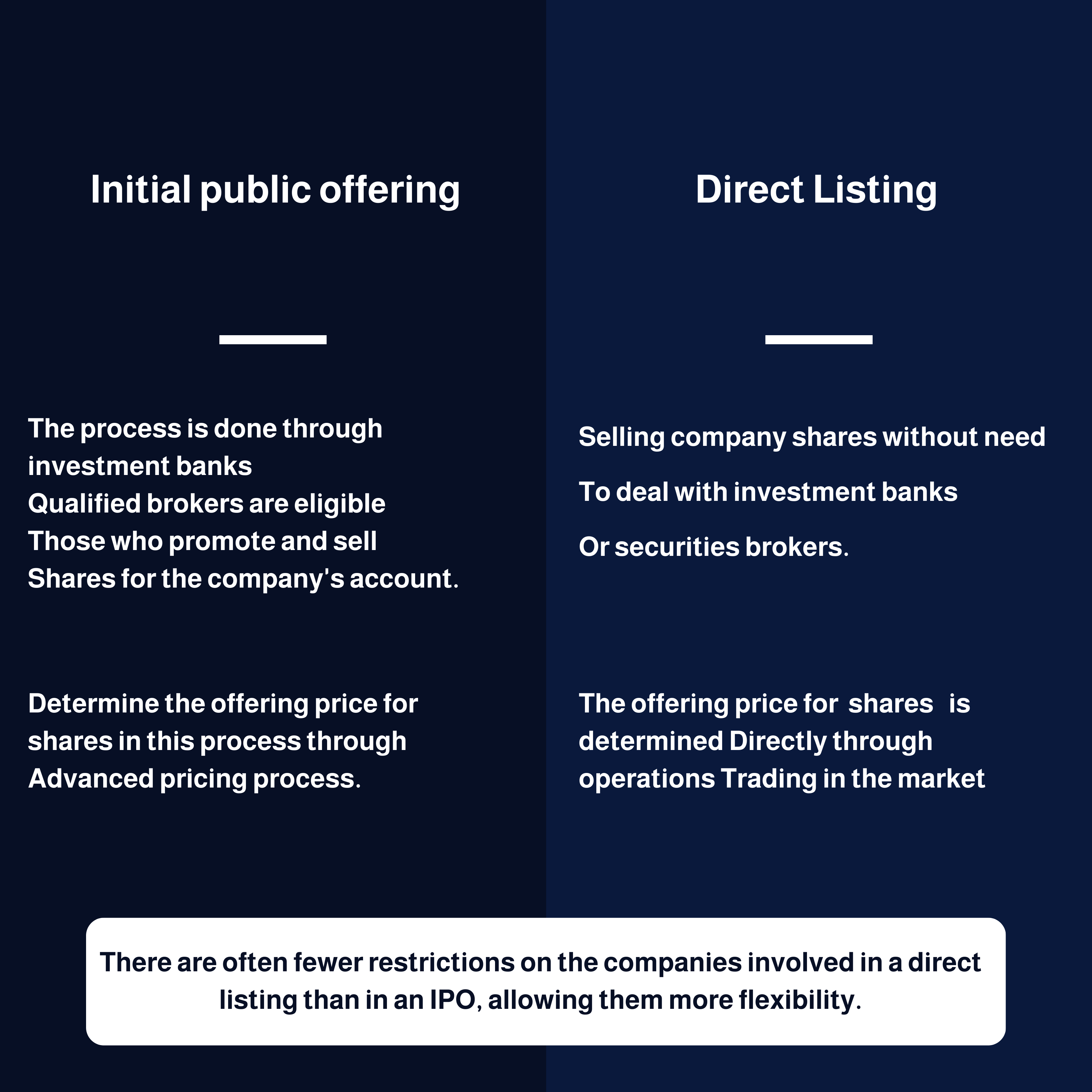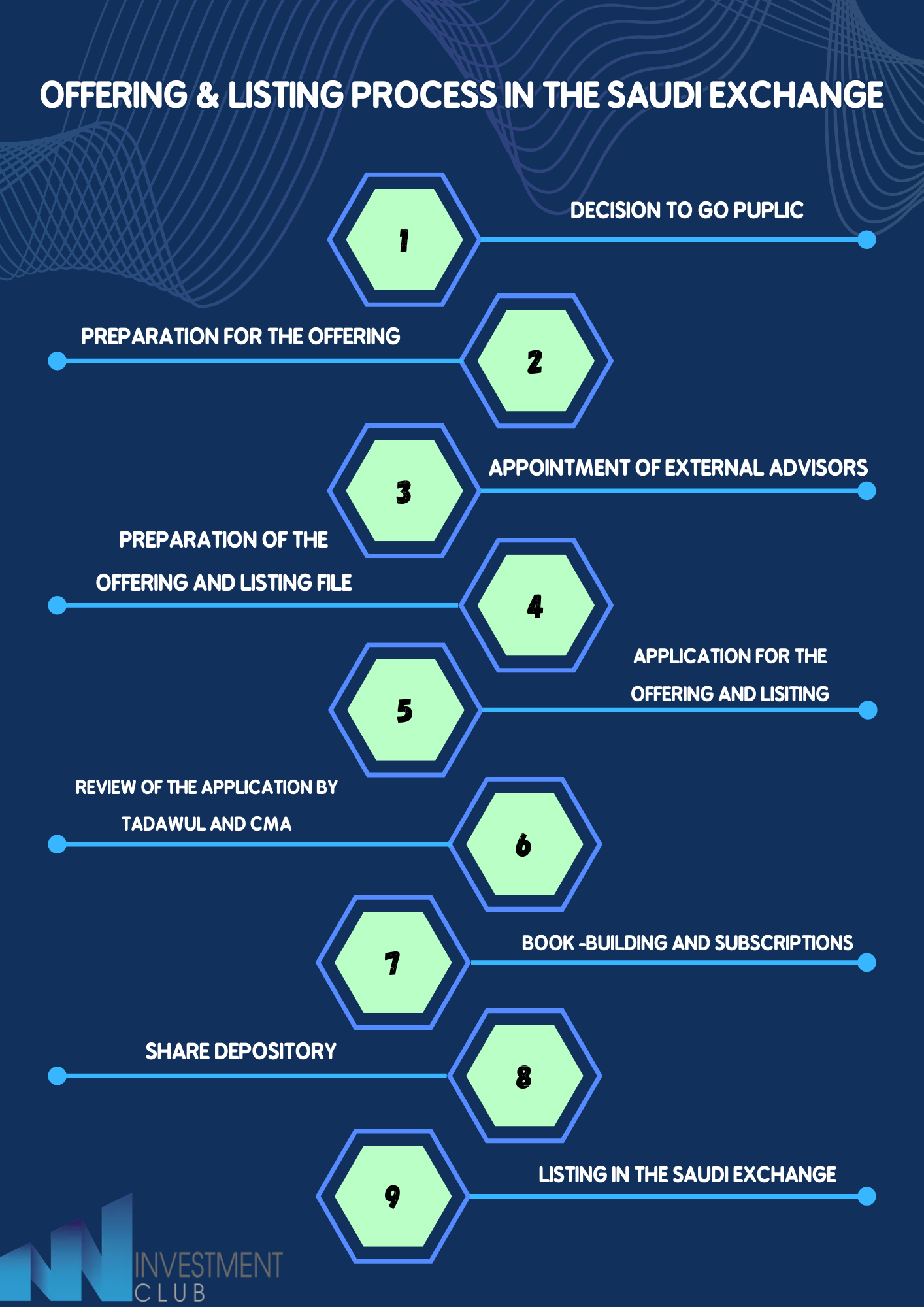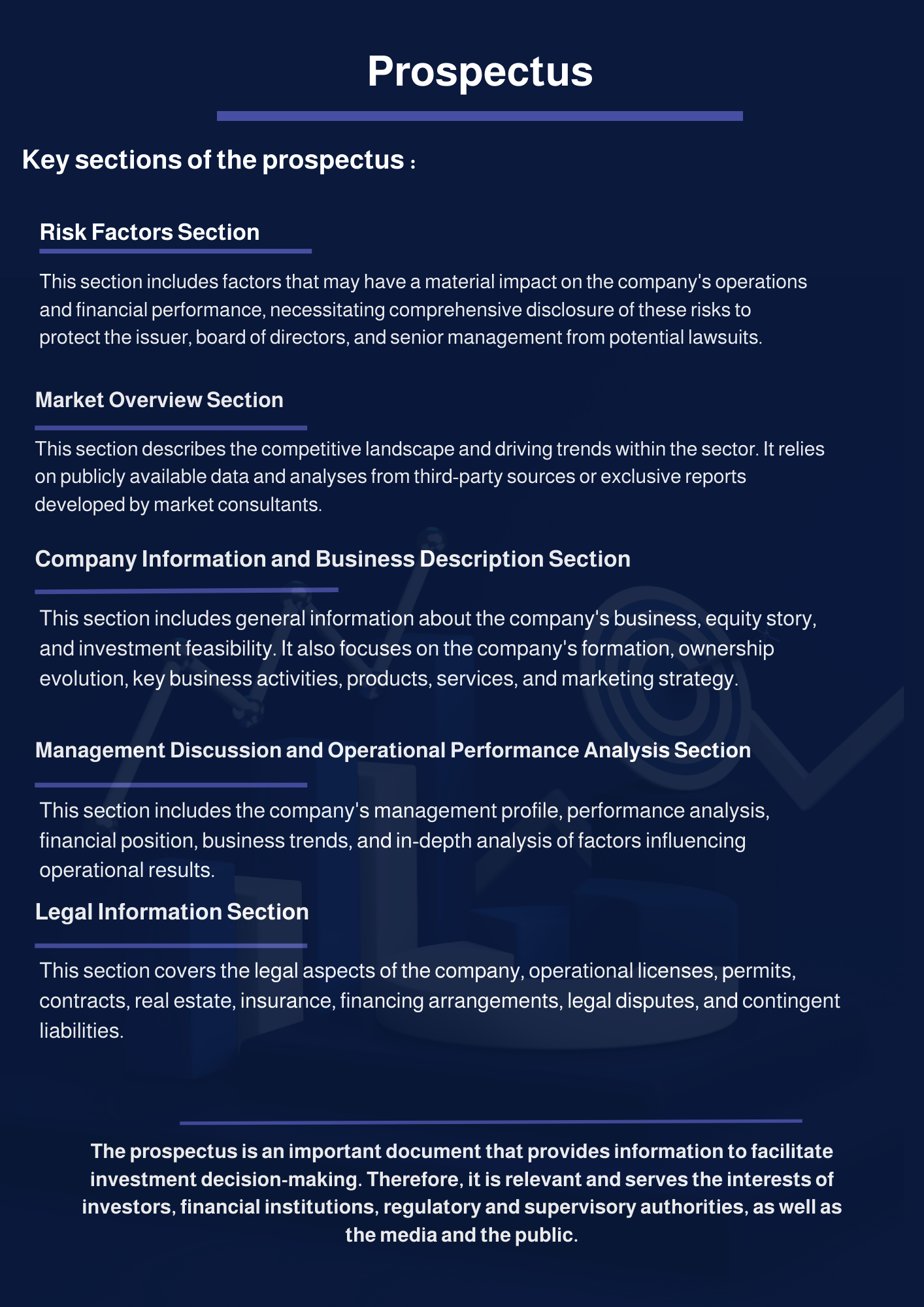IPO and listing in the Saudi market

In light of the development of the Saudi financial market and the growth of the Kingdom’s economy, underwriting is one of the vital factors that contribute to enhancing this growth. An initial public offering (IPO) is the process through which a privately owned company offers its shares to the public for the first time, thus becoming a public joint stock company.
Companies decide to become publicly traded for various reasons, including:
- Raising capital: When companies go public, they sell ownership shares to the public in exchange for money. The capital raised can be used for various purposes such as expansion, research, debt repayment, acquisitions, or restructuring the capital.
- Liquidity for shareholders: Going public provides existing shareholders, including founders and employees, a platform to sell their shares on the public market, enabling them to generate income from their investments and diversify their investment portfolios. This enhances the liquidity of its shares, which in turn increases the value of the company.
- Brand recognition and enhanced market presence: Listing on a stock exchange enhances a company's brand recognition and position, showcasing its success and maturity to stakeholders. This can increase market share by attracting more customers, investors, and business partners.
- Governance: Adherence to governance principles is important for companies, especially family ones, as these practices contribute to building confidence among investors and enhance transparency and responsibility in company management.
This process is considered an important moment in the life of the company and an important time for private investors to realize the full gains from their investments because it usually involves an equity premium for existing private investors, while at the same time enabling the participation of public investors in the offer.
In the Saudi stock market, investors can participate in stocks through two markets:
- Primary Market -Tadawul
- Parallel Market - Nomu
Parallel market offering standards vary from the main market, as the parallel market is considered more flexible in terms of offering requirements and financial disclosure requirements.
Financial disclosure requirements in the Main market - Tadawul:
- Disclosing the quarterly financial statements within a period not exceeding 30 days from the end of the period.
Disclosure requirements in the Parallel market - Nome:
- Disclosing the quarterly financial statements within a period not exceeding 45 days from the end of the period.
- The Main market Tadawul:
It is the largest and most liquid financial market in the Middle East and North Africa region, which includes companies that wish to offer their shares in the financial market for the first time and are subject to the rules of offering and continuing obligations set by the Authority and the listing rules set by the Saudi Tadawul.
Conditions related to the inclusion of stocks on the main market:
1. The company must have practiced its main activity for at least three years.
2. Providing Audited financial data for three years.
3. The source must be a joint stock company.
4. The presence of sufficient liquidity:
- The number of shareholders should not be less than 200 shareholders.
- The public ownership of the shares is not less than 30%.
- It is permissible for the market after obtaining the approval of the commission - to allow a lower percentage or fewer number of shareholders if it sees the occasion of that, given the number of shares of the same category and distributing them to the public.
5. The expected total market value at the list should not be less than 300 million Saudi riyals.
- The market may allow the inclusion of shares of less market value if it sees that the market is sufficient liquidity for these shares.
- Nomu-Parallel Market
A parallel market with fewer requirements for inclusion is an alternative platform for companies wishing to include through traditional public offering or direct listing, and investing in this market is dedicated to eligible investors only.
The main characteristics are three:
- Market with more flexible standards and requirements.
- Investment is only dedicated to qualified investors.
- The possibility of moving to the main market after taking approvals from the regulators.
Qualified Investors:
1. Capital Market Institutions trading on their behalf.
2. Individuals eligible to open an investment account within the Kingdom and an account with the Securities Depository Center Company ("Edaa"), provided they meet any of the following criteria:
- Engaged in capital market transactions totaling at least SAR 40 million and conducted at least ten transactions each quarter over the past twelve months.
- Possess net assets totaling at least SAR 5 million.
- Have a minimum of three years' experience in the financial sector, either currently or previously.
- Hold the General Securities Qualification Certificate "CME-1" recognized by the CMA.
- Holds a professional certificate that is related to dealing with securities and accredited by an internationally recognized entity.
3. Clients of a Capital Market Institution by the Authority to conduct managing activities provided that this Capital Market Institution has been appointed as an investment manager on terms which enable it to make decisions concerning the acceptance of an offer and investment in the Parallel Market on the client’s behalf without obtaining prior approval from the client.
4. The Government of the Kingdom, any government body, any global/international authority recognized by the CMA or the Exchange, and any other stock exchange recognized by the CMA or the Securities Depository Center Company (“Edaa”).
5. Government-owned companies either directly or through a portfolio managed by a person authorized to carry out managing activities.
6. Companies and funds established in a member state of the Cooperation Council for the Arab States of the Gulf.
7. Investment Funds.
8. Non-resident foreigners permitted to invest in the Parallel Market and who meet the requirements stipulated in the Guidance Note for the investment of Non-Resident Foreigners in the Parallel Market.
9. Qualified foreign financial institutions.
10. Any other legal persons allowed to open an investment account in the Kingdom and an account at Securities Depository Center Company (“Edaa”).
11. Hold a specialized professional certificate in securities business approved by the Authority or an internationally recognized body.
12. Any other persons prescribed by the CMA.
Risks related to investing in the Nomu market:
- Low requirements for disclosure of risks related to investing in Nomu.
- Increased volatility.
- Low governance requirements.
The requirements for offering and listing in a Nomu market according to certain conditions:
- The source must be a joint stock company.
- The company's market value must be at least 10 million Saudi riyals.
- At least 20% of the shares must be offered to the public, or the issuing entity can list shares worth a minimum of 30 million Saudi riyals.
- The number of public shareholders must not be less than 50 at the time of listing.
- There must be a core operational activity for at least one year.
- Appointing of a mandatory financial advisor, and optional appointment of a legal advisor.
- Annual audited financial statements for the company.
- Semi-annual financial statements.
- Disclosure of essential information.
- There is no requirement for the company's profitability.
- Prohibition of selling founder shares for one year from the listing date.
Direct Listing in Nomu-Parallel Market
Saudi Exchange is the first GCC exchanges to allow Direct Listings, which will enable companies to directly list their shares in Nomu - Parallel Market without an offering whether for institutional or individual investors, and through it the company will be able to sell the minimum required liquidity in the financial market within a period not exceeding 12 months from the date of listing.
Direct listing is an option for companies that want to enjoy the benefits of going public without going through the traditional IPO process; This stage shortens many of the common initial offering stages, thus saving a lot of time, money and effort in the listing process on the financial market.
Companies that wish to directly list on Nomu must comply with the following requirements:
- Meeting all Nomu market direct listing requirements as stipulated in the listing rules.
- Appointing a financial advisor to offer advisory to the issuer in regard to implementing market rules and regulations, as well as any other regulations imposed upon Nomu – Parallel Market issuers.
- Additional criteria that the issuer must meet to ensure the availability of sufficient liquidity in the shares subject to the direct listing request in the parallel market in accordance with Paragraph (C) of Article (43) of the Listing Rules.

Can companies transition from the Saudi Parallel Market to the Main market?
Yes, when a company desires to move from the Saudi Parallel Market to the Main market it is required to meet the following criteria:
- Submit the application after two years have passed since the company's shares were listed on the growth market.
- Disclose all requirements for listing on the main market, except for market capitalization, ensuring that the company's total market capitalization during the six months preceding the application exceeds 200 million Saudi riyals.
- Disclose to the public, before submitting the application, the board of directors' report and the required information according to relevant executive regulations.
- Obtain the board of directors' approval for the transition to the main market and disclose it to the public before the trading session following the approval.
- Announce to the public when submitting the application to transition to the main market.
Companies wishing to transition also undergo liquidity adequacy confirmation standards for shares.
After announcing the market's approval of the company's shares transitioning to the main market, trading of the company's shares is suspended for a period not exceeding five trading sessions until the transition procedures are completed. Afterwards, the company's shares are traded on the main market.
Steps of listing and offering shares in the Saudi market
It's important to recognize that the methods and steps taken may differ depending on the company and the current state of the market.
The process of offering shares to the public and listing them for trading in the market is divided into two fundamental stages:
First: The preparatory stage includes preparing and internally preparing the issuing entity.
The preparatory stage begins with the decision to offer, followed by the appointment of competent advisors in their respective fields, and finally with the preliminary meeting.
Here are the steps involved in the process:
1- Decision to Offer:
- The company's management has made the decision to proceed with the public offering.
- establishes an internal team to identify any obstacles that may affect the public subscription process.
2- Appointing accredited advisors: A company must appoint various external advisors who are each an expert in their respective areas:
Financial Advisor: The main investment bank partner of the company, responsible for guiding the company throughout the offering process and providing financial advice. They specialize in coordinating the due diligence process, developing investment attractiveness, and structuring the offering. They market the stocks to investors and handle their distribution and depositing in portfolios.
Legal Advisor: Ensures compliance with legal and regulatory requirements of the process, including the required documents and procedures. They prepare the due diligence report, assist in drafting the prospectus, and support the company in legal restructuring or reorganization processes.
Financial Auditors: Review and evaluate the company's financial statements required for the IPO, using their opinions to clarify the quality, trends, and behavior of this data. Their role also includes preparing the required financial due diligence report and preparing a working capital report for the company.
Market Consultant: Analyzes the company's business and the sector in which it operates, up to its past performance and position in the market, understands the sector's future expectations and writes a market study report to help develop the company's business plan and financial projections.
Other external consultants and service providers: The Company may be required to appoint other advisors, depending on the nature of the offer.
3-Preliminary Meeting:
- During the meeting, a detailed presentation is prepared for management, outlining the proposed business model, expected market strategy, range of products and services offered, financial estimates, and any other relevant aspects.
- Approval of the project's governance framework is obtained during this stage to facilitate the smooth implementation of the offering process.
- The purpose of this presentation is to educate all investors about the company's activities and deepen their understanding.
Before the initial public offering (IPO) stage, companies can assess their readiness for listing through the IPO Readiness Assessment Tool, developed in collaboration between Tadawul and Ernst & Young to assist companies and provide them with an initial overview of their readiness for listing. This tool is a questionnaire comprising key questions that companies should ask themselves as candidates for listing on the Saudi stock exchange.
This tool aims to achieve the following:
- Cost Reduction: By providing early guidance on companies' readiness for listing.
- Time-Saving: The tool enables companies to learn about best practices followed in the initial public offering (IPO) markets.
- Increased Confidence: It helps companies better adapt to listing requirements and subsequent post-listing needs and requirements, thereby enhancing their confidence in success and sustainability in the financial market.
You can utilize the tool by clicking here!
Second: The public offering stage
- Preparation of the Offering and Listing File: This stage involves ensuring general readiness, conducting confirmatory due diligence, determining the company's market value, and preparing the prospectus.
- Application for Offering and Listing: The Saudi Arabian Capital Market Authority regulates the rules for offering securities, continuous obligations, and listing in the financial market.
- Review of the Application by Tadawul and the Capital Market Authority: It takes ten days for the Saudi Exchange to issue a conditional approval for listing but could take the CMA up to 45 days to approve or decline a registration and offering application.
- Building the Order Book and Subscription Period: After approval is granted, the prospectus is posted on the CMA website, stating the issuer's intention to offer shares, providing a brief description of the offering, its size, and the names of the responsible advisors. Before the process begins, the issuer and the subscription manager determine the price range of the shares to guide investor offers. Then, the offering process commences, and applications are received from local and international institutional investors.
- Share Depository: After the subscription period ends, the final allocation of shares is determined by the issuer and shareholders, based on the recommendation of the financial advisor. The final share allocation is determined by the issuer and registered with the Saudi Exchange and Securities Depository Center (Edaa).
- Listing in the Financial Market: The company is now listed on the Saudi Arabian financial market for trading.

Prospectus
The prospectus is a crucial document that contains all regulatory information, disclosures, commitments, and obligations of the company. It ensures that all essential information about the company is available to the public.
Due to its significant impact on the market reception of the company's offering, the prospectus should be given careful attention. It provides marketing messages regarding the offering to potential investors and serves as the most transparent source for them.

Investment banks play a Critical role in the IPO process by providing various services to companies looking to go public:
- Underwriting Services: Investment banks serve as underwriters for the IPO, assisting the company in determining the offering price, the quantity of shares to be issued, and the timing of the offering. They also pledge to buy shares from the company and subsequently sell them to investors.
- Regulatory Compliance: Investment banks assist the company in navigating the regulatory obligations linked to going public, which involves submitting documents to regulatory authorities.
- Financial Advisory: Investment banks offer financial guidance to the company throughout the IPO process. This involves assessing the company's financial status, preparing financial statements and prospectuses, and advising on the most suitable timing and structure for the offering.
- Marketing and Distribution: Investment banks play a role in promoting the IPO to potential investors, fostering awareness about the offering, and generating interest from both institutional and retail investors.
Resources:
- https://www.investopedia.com/ask/answers/advantages-disadvantages-company-going-public/
- https://www.saudiexchange.sa/wps/wcm/connect/5b40223e-348c-44df-b1c4-22823b71328e/Listing+Rules.pdf?MOD=AJPERES&CVID=omQsngL https://youtu.be/phvItdAXBUE?si=FG2jic9yFQ6fRXVL
- https://www.tadawulgroup.sa/wps/portal/tadawulgroup/portfolio/saudi-exchange?locale=ar
- https://cma.org.sa/Awareness/Publications/booklets/Booklet_2.pdf
Prepared by:
- Norah Alhazzany
- Lyan Alotaibi
- Layan Alhomaidhi